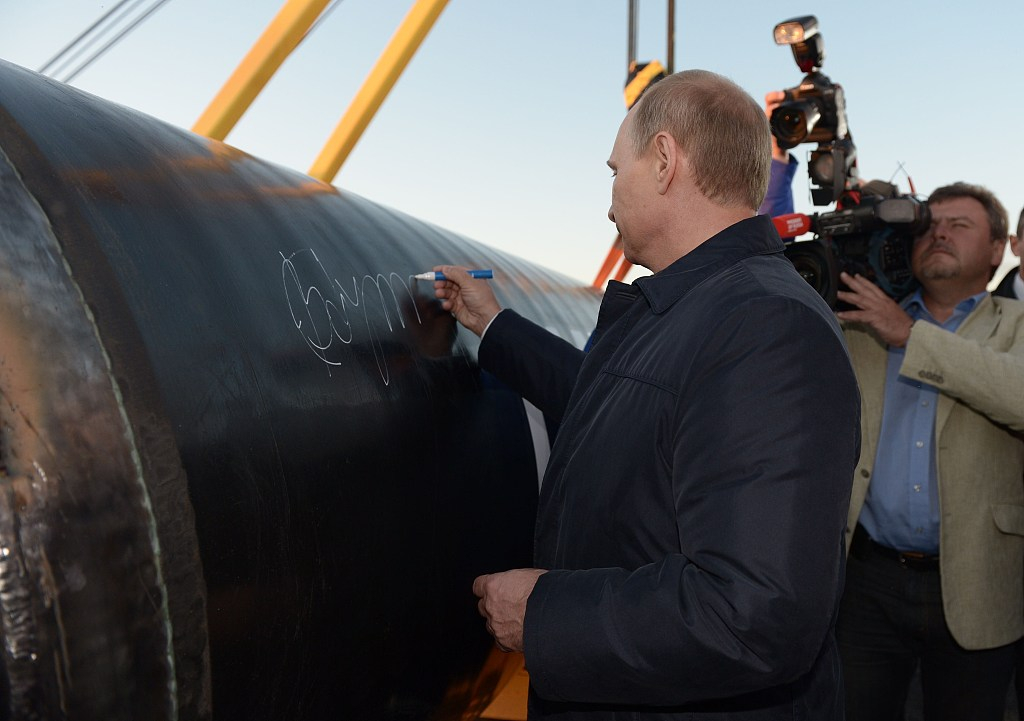
A part of the Power of Siberia pipeline in Heilongjiang Province. /VCG Photo
A part of the Power of Siberia pipeline in Heilongjiang Province. /VCG Photo
Editor's Note: Huang Jiyuan is an opinion editor with CGTN Digital. The article reflects the author's opinions, and not necessarily the views of CGTN.
I think it is safe to say that when the energy deal between China and Russia was announced in 2014, no one expected that the Western coalition would be falling apart in the next couple of years and the geopolitical center would shift so dramatically.
The American nationalistic and antagonistic approach to international relations has shaken the core of the transatlantic partnership. Europe, now under the leadership of French President Emmanuel Macron and German Chancellor Angela Merkel, has publicly rebuked commands from Washington on principal economic decisions like Huawei and 5G. Turkey has rekindled its once fraught relationship with Russia. And China with its Belt and Road Initiative is cementing its relationship with the rest of the Eurasian continent.
This new international environment requires a new look at the operation of the "Power of Siberia" pipeline. What the pipeline truly signifies in the age of upheavals in international relationships is that the "my way or the highway" U.S. attitude is mere self-indulgence. The United States has always used the difference in political systems and diplomatic philosophies to attack China. It has branded China's centralized governing system as non-responsive to the people. It has called China's win-win foreign policy principle as selfish. And with each passing day, the United States seems to be more aversive towards doing business with any country that doesn't look like itself.
But, over the past several years, it is the U.S. system and philosophy that have created indecision and immeasurable loss and harm to the public interest. Changes in political calculation have driven U.S. politicians to abandon policies they once favored. Those who once supported projects like the Keystone XL Pipeline or the Trans-Pacific Partnership denounced them for political advancement. A 180-degree turn on global policies from one administration to another seems to be a common practice, disregarding that these policies are addressing critical challenges like climate change.

Russian President Vladimir Putin signs a pipe during the ceremony marking the welding of the first link of "The Power of Siberia" main gas pipeline on September 1, 2014. /VCG Photo
Russian President Vladimir Putin signs a pipe during the ceremony marking the welding of the first link of "The Power of Siberia" main gas pipeline on September 1, 2014. /VCG Photo
If a country can claim something to be in the public interest at one moment and denounce it as harmful on the level of national security or sovereignty at the next, then policy is just a tool and a joke. It makes U.S. politics wobbly at best, hypocritical at worst.
On the contrary, while navigating through a disoriented international system, China hasn't lost its sight of objectives that benefit the general public. The stability in the central government's long-term goals and its "win-win" pursuit in international relationships have led not to whimsical policy decisions, but well-thought-out and executed ones with a singular focus. For more than five years, China has held on to the pipeline in spite of changes in the international environment.
And so has Russia. Both countries' foreign policy, based on the pursuit of mutual interest, made the materialization of the pipeline possible. As associate research fellow at the Institute of Russia, Eastern European and Central Asian Studies at the Chinese Academy of Social Sciences Guo Xiaoqiong says in her article "Natural gas cooperation to boost Sino-Russian ties," the pipeline benefits both China and Russia. It is the product of China and Russia's complementarity of interests. China needs cleaner energy to deal with the pollution problem that's been dogging its cities. Russia wants stable revenue from energy exports. And together, the pipeline could revive the prosperity of China's northeastern provinces and Russia's Far East region.
The operationalization of the pipeline is proof that the world doesn't just function based on a single system. Americans may believe that theirs functions well, but that doesn't disqualify other systems from being equally functional or even superior in making and executing long-term goals that benefit the public.
The pipeline has elevated the bilateral relationship to a new level and will benefit future generations. And with this new linkage, China's and Russia's common interests would be more intertwined, making mutual benefits even more important going forward. And as Chinese President Xi Jinping said at the official ceremony launching the Power of Siberia pipeline, the China-Russia relationship will be of utmost importance in China's foreign policy.
(If you want to contribute and have specific expertise, please contact us at opinions@cgtn.com.)